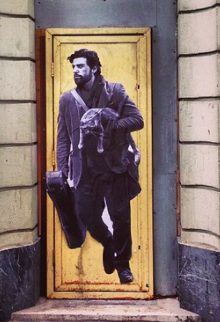Words by Emma Green
The discovery of new art at the precise moment it intersects with your life is wonderfully serendipitous. In 2014, whilst living and working in Bristol, and dreaming of a career in film and television, Inside Llewyn Davis had its theatrical release. As such, the twenty-first cinematic outing for The Coen Brothers became my first introduction to the mastery of Joel and Ethan, and it remains my favourite.
A gorgeous period piece set in Greenwich Village during the early 1960s, the film details a week in the life of Llewyn Davis (Oscar Isaac), a folk singer struggling to keep his life in order. For Llewyn, music is his raison d’être and a life without it – so he tells his sister – spells a life of pure existence. Yet in spite of his musicality, Llewyn’s life is laden with personal and professional failures, and he remains reluctant to compromise.
In addition, Llewyn’s musical métier occurs just before the folk explosion of the sixties, with executives and managers alike failing to acknowledge the value of his artistry. Subsequently, by the film’s conclusion, Llewyn finds himself (literally and metaphorically) beaten down by life, bowing out at the precise moment a Dylanseque figure takes to the stage singing ‘Farewell’. Here, Inside Llewyn Davis feels less like a black comedy and more like a tragedy.
Whilst self-reflexivity has long been a common thread within the Coen Brother’s oeuvre, Inside Llewyn Davis follows suit, putting another protagonist through a hellish journey. However, the film offers neither the surrealism of Barton Fink (1991) nor the irreverence of Hail Caesar! (2016). Instead, its sombre tone and cold aesthetic – set amidst a New York winter – details the difficulty of cultivating a career in the arts, with Llewyn’s unfulfilled artistic dreams becoming a cautionary tale of sorts.
Llewyn’s career does not keep him warm at night, it does not put a roof over his head, nor does it love him in return. By subverting from the razzle dazzle of a conventional Hollywood ending, the film’s denouement is ultimately bittersweet. In retrospect, I am left with a spark of hope for Llewyn’s future, but, for the most part, I feel sorrow over the loss of his unrewarded talent.
It may seem strange, then, to suggest a film of such melancholy as a positive encounter for my younger self; yet I find great value within Inside Llewyn Davis. Success, it seems, is a weird science – a pinch of luck, a dash of timing, a smidgen of talent and a ton of determination. Luck, timing and talent are hard to manufacture, yet determination is within human grasp.
For me, the film earnestly begs the question; how do you know when to persevere or when to give up? And which of these actions is the most noble.
Like Llewyn, I understand the heady desire to have a career of creative integrity. As such, I am still chasing the proverbial dream of a purposeful vocation. It is why I’m studying at university. Yet, I understand that the business of show is a harsh and fickle road to success. To paraphrase Llewyn, the pursuit of an artistic life was never new, and it never gets old. And much like a folk song Inside Llewyn Davis should be passed down from generation to generation.

